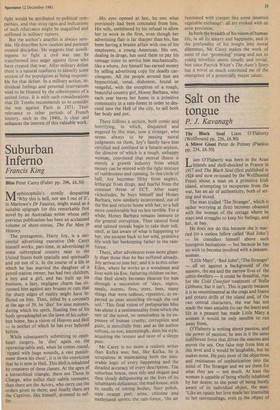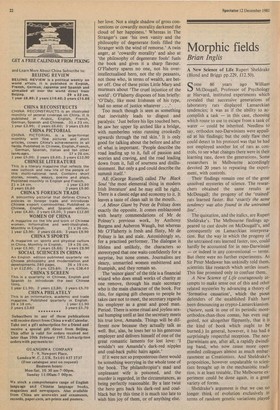Salt on the tongue
P. J. Kavanagh
The Black Soul Liam O'Flaherty (Wolfhound pp. 256, £6.90) A Minor Giant Peter de Polnay (Piatkus pp. 234, £6.50) T iam O'Flaherty was born in the Aran L./Islands and shell-shocked in France in 1917 and The Black Soul (first published in 1924 and now re-issued by the Wolfhound Press) about a man on a primitive Irish island, attempting to recuperate from the war, has an air of authenticity, both of setting and mood.
The man (called 'The Stranger', which is rather worrying at first) becomes obsessed with the woman of the cottage where he stays and struggles to keep his feelings, and her, at bay.
He does not do this because she is married (to a useless fellow called 'Red John') — he considers himself above such bourgeois hesitations — but because he has no wish to become involved with a peasantwoman.
'Little Mary', 'Red John', 'The Stranger' — all set against a background of the seasons, the sea and the narrow lives of the cabin-dwellers — it could be dreadful, ripe for the Cold Comfort treatment of Stella Gibbons; but it isn't. This is partly because it is as unsentimental as the crags and foams and potato drills of the island and, of the two central characters, the war has not made the man amiable (to say the least) and life as a peasant has made Little Mary a woman it would be only sensible to run away from.
O'Flaherty is writing about passion, and the power of passion; he sees in it the same indifferent force that drives the seasons and moves the sea. One false step from him at this level and it would be laughable, but he makes none. He puts most of the objections and resistances of sophistication into the mind of The Stranger and we see them for what they are — not much. At least the woman is capable of being wholly inhabited by her desire; to the point of being barely aware of its individual object, the man: 'Like an opiate her love made her insensible to her surroundings, even to the object of her love. Not a single shadow of gross conventions or cowardly morality darkened the cloud of her happiness.' Whereas in The Stranger's case 'his own vanity and the philosophy of degenerate fools filled the Stranger with the wind of remorse.' A twin anger, at 'cowardly morality' and also at 'the philosophy of degenerate fools' fuels the book and gives it a sharp flavour. O'Flaherty spares no one, not his overintellectualised hero, not the sly peasants, not those who, in terms of wealth, are better off. One of these pities Little Mary and murmurs about 'The cruel injustice of the world'. O'Flaherty disposes of him briefly: 'O'Daly, like most Irishmen of his type, had no sense of justice whatever . .
Too much though is seen as something that inevitably leads to disgust and paralysis: 'Just before his lips touched hers, he saw her upper lip arched like a bridge, with numberless veins running crookedly upwards through the red skin.' It is only good for talking about the before and after of what is important. 'People describe the road leading up to it, full of passion and worries and craving, and the road leading down from it, full of sourness and disillusionment. But only a god could describe the summit itself.'
AE (George Russell) called The Black Soul 'the most elemental thing in modern Irish literature' and he may still be right. There is a classic edge and economy to it. It leaves a taste of clean salt in the mouth.
A Minor Giant by Peter de Polnay does exactly the opposite. It comes emblazoned with hearty commendations of Mr de Polnay's previous work, by Anthony Burgess and Auberon Waugh, but whereas Mr O'Flaherty is fresh and flinty, Mr de Polnay is lax and stale. Astonishingly so, for a practised performer. The dialogue is lifeless and unlikely, the characters so stereotyped that one waits confidently for a surprise, but none comes. Journalists are sleazy, unmarried women embittered and frumpish, and they remain so.
The 'minor giant' of the title is a financial wizard who does small works of charity at one remove, through his male secretary who is the main character of the book. For this, for signing gift cheques to people he takes care not to meet, the secretary regards his employer as a great and good man. Period. There is some ritual and joyless sexual humping until at last the secretary meets his true love, Amanda. Things will be different now because they actually talk as well. But, alas, he loses her to his generous employer and delivers himself of one of the great romantic laments for lost love: 'I wouldn't see Amanda's dark-red nipples and coal-back pubic hairs again.'
If it were not so preposterous there would be something worrying in the whole tone of the book. The philanthropist's mad and unpleasant wife is poisoned, and the murder is regarded, in the circumstances, as being perfectly reasonable. By a late twist the hero gets back his dark-red and coalblack but by this time it is much too late to wish him joy of them, or of anything else.







































 Previous page
Previous page